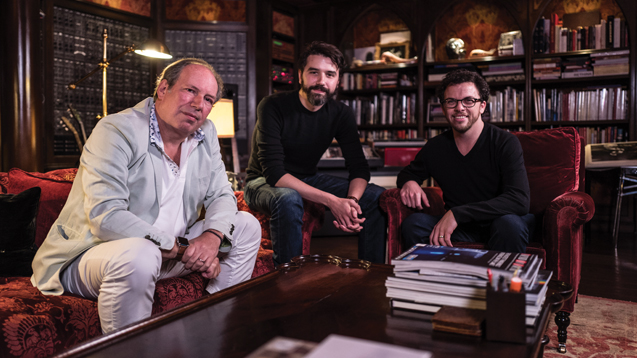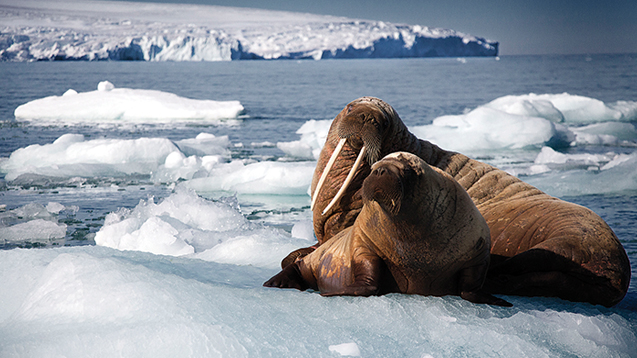Blue Planet II is the BBC One hit wildlife series. Scored by Oscar winner Hans Zimmer, David Fleming and Jacob Shea (pictured left-to-right, below) for Bleeding Fingers Music, it’s the UK’s most-watched TV show of 2017 so far. Pulling in an audience of 14.1 million for its first episode, its emotive score brings the marvel of the planet’s oceans to life. Here, Jacob and David tell us how they soundtracked the action…
Jacob: Hans, David and I approached writing for Blue Planet II just as if we were scoring a movie, because the series is very cinematic in nature. The trials and tribulations these animals’ experience are very universal at their core: finding love and figuring out how to survive in a hostile environment. These are things that all humans deal with.
David: We decided to develop a common musical thread for each episode, which proved an inspiring jumping off point. Each one was different. For example, in the episode about the open oceans we used sparse, dry guitars and tense strings to evoke the harsh, desert-like conditions of these vast and almost desolate seas. The episode on coral reefs called for woodwind and the occasional Gershwin homage to highlight the frenetic pace of what could be thought of as the ocean’s bustling cities.
The fun of creating these concepts and accompanying sound palettes with Hans and Jacob was figuring out when to use them and when to break from them in order to tell a more specific story. Whether it was a pirate sea shanty for the galleon-shaped Portuguese man-of-war, or a retro bossa nova for an undersea turtle spa, there were so many amazing opportunities for colourful, individual moments.
Jacob: I think it was very helpful to have three composers working on the project so we could personify the music and convey emotion. Each one of us was really detail-oriented when it came to scoring each scene. For the walrus section in particular, I tried to bring out the various emotions contained within the mother and cub scene. The melting of the icebergs is really tragic for these animals. This scarcity of resources forces them to be combative in order to survive. It’s a complex and layered story.
David: The Mobula rays’ footage is really special to me personally. The scene is just so visually inspiring. There are these beautiful shots of huge rays jumping, almost flying out of the water, at sunset. Then, the end of the scene is filmed underwater in almost complete darkness. Lit only by glowing bioluminescent plankton, the cameras were able to record these rays weaving around each other and colliding in what looks like a giant, almost animated dance. I used a slow, sweeping waltz to highlight the romanticism and grace of what could otherwise be seen as a chaotic frenzy of movement.
Jacob: Hans, David and I approached writing for Blue Planet II just as if we were scoring a movie, because the series is very cinematic in nature. The trials and tribulations these animals’ experience are very universal at their core: finding love and figuring out how to survive in a hostile environment. These are things that all humans deal with.
David: We decided to develop a common musical thread for each episode, which proved an inspiring jumping off point. Each one was different. For example, in the episode about the open oceans we used sparse, dry guitars and tense strings to evoke the harsh, desert-like conditions of these vast and almost desolate seas. The episode on coral reefs called for woodwind and the occasional Gershwin homage to highlight the frenetic pace of what could be thought of as the ocean’s bustling cities.
The fun of creating these concepts and accompanying sound palettes with Hans and Jacob was figuring out when to use them and when to break from them in order to tell a more specific story. Whether it was a pirate sea shanty for the galleon-shaped Portuguese man-of-war, or a retro bossa nova for an undersea turtle spa, there were so many amazing opportunities for colourful, individual moments.
Jacob: I think it was very helpful to have three composers working on the project so we could personify the music and convey emotion. Each one of us was really detail-oriented when it came to scoring each scene. For the walrus section in particular, I tried to bring out the various emotions contained within the mother and cub scene. The melting of the icebergs is really tragic for these animals. This scarcity of resources forces them to be combative in order to survive. It’s a complex and layered story.
David: The Mobula rays’ footage is really special to me personally. The scene is just so visually inspiring. There are these beautiful shots of huge rays jumping, almost flying out of the water, at sunset. Then, the end of the scene is filmed underwater in almost complete darkness. Lit only by glowing bioluminescent plankton, the cameras were able to record these rays weaving around each other and colliding in what looks like a giant, almost animated dance. I used a slow, sweeping waltz to highlight the romanticism and grace of what could otherwise be seen as a chaotic frenzy of movement.

Jacob: We usually start working on a project when the editors have a rough assembly, and this was the case for Blue Planet II as well. We first got started writing music to rough edits of the scenes and, as the scenes got tightened, we also went in and tightened up our cues.
David: I find it’s always better to get involved in a project as early as possible – that way, we can start developing recurring themes for the entire series. But the truth is, even in its roughest form, the Blue Planet II editors were brilliant at carving intimate stories and relatable characters out of a truly massive amount of footage. Most of our job was to highlight, and hopefully elevate, the story as it took shape.
We were always present for the orchestral recording sessions, either in person or remotely from Los Angeles. We did several large sessions in Vienna, recorded by the inimitable Geoff Foster. We had the privilege of working with a group of 62 amazing musicians, including strings, woodwinds and choir. Every musician involved brought their own personality to the music and really elevated the score.
There were also several recording sessions done early on for the ‘tidal orchestra’ theme we created, which was incredibly useful in terms of avoiding sound clichés. These recordings of orchestral textures were created in association with Spitfire Audio. The idea was to apply impressionistic techniques to the orchestra in order to evoke the sound and spirit of the sea. It was always helpful to have this original concept tying the score together.
Jacob: With Blue Planet II now on air, it’s been thrilling and really heartening to see the programme, which showcases the planet’s natural wonders, become so popular.
David: It’s incredibly gratifying to be involved in a series that is beloved across so many different demographics. It seems like most people we speak to have some personal connection to watching the original Blue Planet series, and remember being moved by it. It’s great that Blue Planet II is having a similar effect, all over again.
David: I find it’s always better to get involved in a project as early as possible – that way, we can start developing recurring themes for the entire series. But the truth is, even in its roughest form, the Blue Planet II editors were brilliant at carving intimate stories and relatable characters out of a truly massive amount of footage. Most of our job was to highlight, and hopefully elevate, the story as it took shape.
We were always present for the orchestral recording sessions, either in person or remotely from Los Angeles. We did several large sessions in Vienna, recorded by the inimitable Geoff Foster. We had the privilege of working with a group of 62 amazing musicians, including strings, woodwinds and choir. Every musician involved brought their own personality to the music and really elevated the score.
There were also several recording sessions done early on for the ‘tidal orchestra’ theme we created, which was incredibly useful in terms of avoiding sound clichés. These recordings of orchestral textures were created in association with Spitfire Audio. The idea was to apply impressionistic techniques to the orchestra in order to evoke the sound and spirit of the sea. It was always helpful to have this original concept tying the score together.
Jacob: With Blue Planet II now on air, it’s been thrilling and really heartening to see the programme, which showcases the planet’s natural wonders, become so popular.
David: It’s incredibly gratifying to be involved in a series that is beloved across so many different demographics. It seems like most people we speak to have some personal connection to watching the original Blue Planet series, and remember being moved by it. It’s great that Blue Planet II is having a similar effect, all over again.

.ashx?h=67&w=80&la=en&hash=340524FD746527338490DF251ABF8B71)
